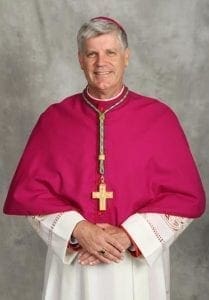Power off and power up!
By BISHOP BERNARD E. SHLESINGER III, Commentary | Published February 7, 2022 | En Español
Recently I had a conversation with a young man about the challenges he faced in living his Catholic faith. He confessed that one of his greatest struggles was managing the use of his smartphone and the internet. Given such easy access to information through the internet and the ability to readily connect to others in cyberspace, we, like this young man, can find it more difficult to be detached, unplugged and disconnected from the smartphone, and thus we experience loneliness.

Bishop Bernard E. Shlesinger III
Pope Francis has said that the net “is an opportunity to promote encounter with others, but it can also increase our self-isolation, like a web that can entrap us.” His concern involves young people who may live the illusion that the social media and the web can completely satisfy them on a relational level, as they slowly become “social hermits” who risk alienating themselves completely from society. Pope Francis realizes that this dramatic situation can lead to a serious rupture in the relational fabric of society.
The Christian today must look up to God and not only down on a screen. God cannot be contained in a digital world created by others and navigated by ourselves. To “Be still and know that I am God” (Ps 46) means intentionally refraining from being stimulated through digital media. We must use the ‘power off’ button more frequently and intentionally.
When we speak of fasting today, many think of it as from consuming food; but I think of the Scripture, “when the bridegroom is taken away from them, in those days they will fast” (Lk 5:35) as referring to the need for sober use of the internet. To find the bridegroom that is Jesus, we must refrain from indiscriminate use of the telephone, television, the computer and of the internet that is often superfluous.
We must remember that inspiration is a work of the Holy Spirit. A good and faster connection might be the goal of companies who compete among themselves for high-speed internet availability. However, the goal of a disciple is not to be on high speed but rather slowing down intentionally and being still to know God better.
Father Hilary Ottensmeyer, OSB, once said; “Until we are convinced that prayer is the best way to spend our time, we will not find the time to pray.” The Catechism of the Catholic Church mentions that we face a temptation when we decide to converse with God: “When we begin to pray, a thousand labors or cares thought to be urgent vie for priority; once again, it is the moment of truth for the heart: what is its real love?”
Managing technology in a sober way, rather than being managed by it, may be achieved simply by putting Jesus on the calendar, finding one’s prayer corner and leaving the smartphone turned off and charging in another place.
I shared with the young man that I have never regretted the time I have put into prayer, but have regretted those times I postponed prayer and never got around to it. When one checks emails as the first task after waking up in the morning, one may also discover oneself working throughout the day without a pause for prayer. As we approach the season of Lent, let us think about how we might be more intentional in prayer rather than wandering aimlessly in cyberspace.
Let us power off in order to power up in prayer.